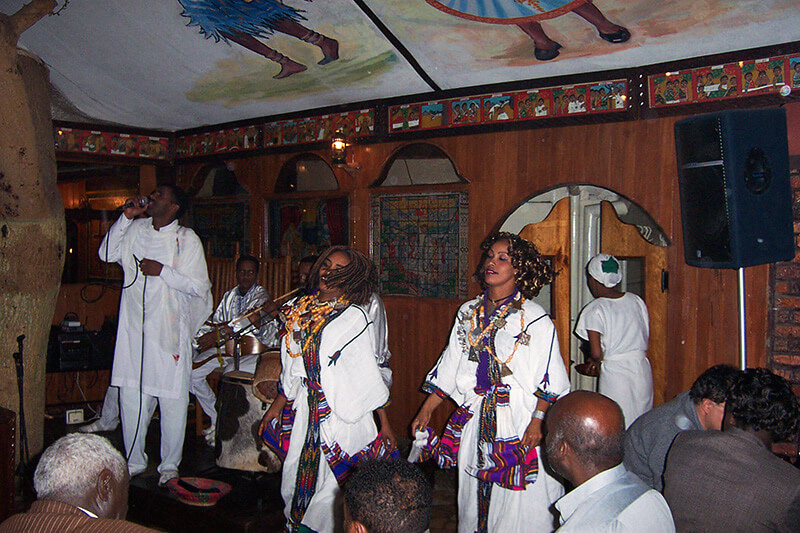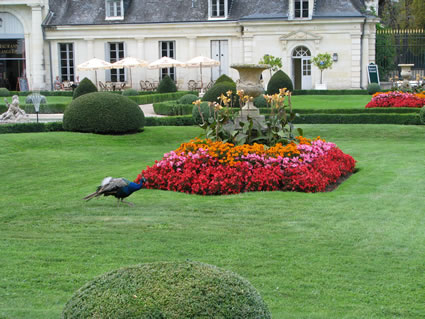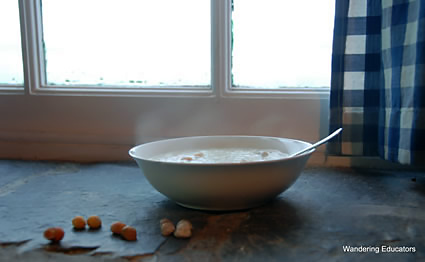Educating Your Five Senses Via Travel
Article by Dr. Jessie Voigts
Wandering Educator Contributing Editor for TransitionsAbroad.com

|
|
Learning new forms of sound and vision from a traditional music group while enjoying new tastes at a dining club in Ethiopia.
|
Would you like to have a travel experience like no other? One that will exhilarate, entrance, and stay with you forever? It’s a different way to look at travel (and life) and can change how you travel. What is it? Well, I call it 5 senses travel. I’m always teaching my students to include all 5 senses in their writing to make them more vibrant. But it goes much deeper than that. When you are involved in educating the senses in your travels, you have a more memorable journey that will stick with you far longer than other travels. How? Take a look…
Sight
The photographer in me rejoices at travel that educates my sight. While I’m always (always!) taking photos, and the ease of cell phone photography has made global photographers out of most of us, I’m talking about something else: photography that goes beyond chronicling what you’re seeing and delves into LEARNING about what you’re seeing. It could be something as simple as choosing a photography tour, where you improve your photography skills by learning alongside a professional in a new location. Or, it could be as involved as volunteering your photographic skills to an NGO, which can genuinely introduce you to the intricacies of a culture through your camera. Go into that with an open mind (banishing any ethnocentrism). You can use your photography skills to experience a destination — and people — in a way you never would have had access to. In both of these suggestions, remember that photography is an exchange, where you genuinely interact with people and cultures and learn something from them. This type of learning? For the price of a camera and travel, these connections, made through the sense of Sight, are extraordinary.
Hearing
One of the joys of travel is the different sounds we hear, whether traffic, languages, music, or even the crash of waves on the shore. How would you educate your hearing sense? Oh, let me count the ways. You could take language classes on your travels, and practice your new skills.
Take a music class! Did you know that many places offer workshops on drumming, bodhran, or other musical instruments? Imagine learning from global musicians — and not only musical technique but the music and essence of a culture. Incredible! If you can’t find a class, follow your ears. One traveler learned about the culture and music of The Gambia by discovering Kora sounds from the Griot Compounds.
Attend musical festivals — there are always music festivals going on, both big and small. If you’re in a different culture, it’s an excellent way to educate your ears and brain on how cultures perceive music and sound. Bhutan’s Paro festival is not only a treat for your ears but your other senses, as well. Discover music festivals by researching, but you can also ask locals what’s happening. They might not think their music festival is “tourist-worthy” — but those are the best experiences, where locals share their talents and celebrations.
Other ways to educate your hearing sense include listening to music from different countries (at home and on your travels) and asking questions. If you’re in an Islamic country, respectfully ask about the sounds of the calls to prayer. If you’re at a concert, especially a small one, talk about their passion for music, training, and lives with the musicians afterward.
One writer discovered the music and rhythm of the Cuban spirit while learning a great deal about the country's culture and people.
Sound has much more context than just hearing — it is interspersed with everything in daily life, all around the world.
Taste
As a foodie, I admit this is my favorite part of travel. And what better way to educate your tastebuds than culinary travel? Whether you view culinary travel as taking classes to make local foods or exploring the best foods of a region, this is definitely an education for the senses. There is no better way to get to know a culture deeply than through its food. You can shop local markets, as I did in Kenmare, Ireland (and got a fantastic recipe for fish chowder from the fishmonger!). A food tour will introduce you to foods — and customs — that most travelers will never discover. Often, these half-day or day-long tours will jumpstart your quest for learning about local foods. You might go back, again and again, to a particular farm or restaurant to try all the offerings they have. You might converse with a local farmer and gain an appreciation for their hard work - and delicious products. There are plenty of home-based cooking classes (or live in!) all around the world, which not only give you a glimpse into a very personal aspect of a culture but also teach you recipes that you can share with loved ones at home, thus extending your culinary travels far beyond any borders.

|
|
Photo Wikimedia Commons: Joadl, adapted by Transitions Abroad.
|
Touch
One of the most colorful parts of travel can be found in the textiles of a culture. I love shopping at local markets, running my hands over knubbly wool sweaters or thin, silky scarves. But there’s more to touch than just shopping. I remember talking with a Hmong woman at a market in Minneapolis about her vividly colored, incredibly detailed embroidery. She whipped out something she was working on and taught me a few stitches, which I practiced on a thick black fabric she pulled from a bulging scrap bag. I bought a beautifully embroidered pillow and learned a lesson in technique (and culture).
Did you know that you can take entire trips based around textiles? One such tour to India visits Bangalore, where a wholesale market showcases textiles from all over South India, including locally-produced silk. Or, you might delve into local textile production on your travels, such as this traveler did in Turkmenistan, getting an education in carpet textiles and a meal and introduction to family life there.
Many cultures have location-specific textiles, such as the indigenous tribes in Guatemala, Scottish plaids, and the stories in each textile created in Laos. They even build their homes using textiles like Mongolian and Kyrgyz Yurts.
Digging in deeply, asking questions, touring museums and markets, and learning about the cultural implications of what people wear and decorate their homes is a fascinating glimpse into a culture, one touch at a time. Textiles are also excellent gifts to bring back home! Once, I received a traditional Kyrgyz hat from a visiting scholar at the university where I was working. It was made from thick, cream-colored felt with dark embroidery and was very tall. I had no idea where I’d wear it until a blizzard hit, and that hat came to the rescue. It’s now my go-to winter hat and keeps me as warm as my Kyrgyz friend intended.
Smell
We could crack jokes here about the aroma of humanity in any hot, crowded train in Asia or the smells of cooking over small fires in enclosed spaces around the world. But I’m talking about educating your nose, not holding it shut. And while the sense of smell often relates to food (I do travel for good food!), it doesn’t have to. What smells do you love? If you are in France, follow the Paris Perfume Trail, where you can learn about scents and how they mingle to create olfactory magic.
Love flowers? Visit arboretums or flower gardens when you travel — and take a class or guided tour, if available. If the morning coffee smell gets you going, maybe you’d like to explore the Coffee Trails in India. Or, visit Grenada, known as the Spice of the Caribbean. Here, you can learn from and visit museums and establishments that produce spices, chocolate, and even rum!
Some volunteers dig deeply (literally and figuratively) into local culture, food, and smells by helping with agricultural efforts. In Zambia, you could help a banana farming village dig reservoirs to improve their farming. Smell the rich orange dirt as you dig and the freshness of the water as it flows into the irrigation channels. Later, sniff the intense fragrance of banana flowers, known as the heart of the banana. Globally, you can volunteer with WWOOF, which offers worldwide opportunities on organic farms. Working on a farm may have you chatting with local farmers as together you harvest musky-smelling grapes, tread grassy fields and pine-scented forests as you scythe a path, chase errant sheep, or enjoy a savory meal together, inhaling the goodness that arises from good company and a job well done.

|
|
The smells while visiting the many castle grounds of the Loire Valley with the abundant flowers, greenery, peacocks, deer, and other wandering animals are unique and a joy for children (as for former kings and queens, and tourists alike). Photo © Transitions Abroad.
|
By educating your senses when you travel, you open yourself up to a broad range of cultural interactions — and memories. Instead of being grumpy at being cooped up in the house on a rainy day in Ireland (and all days are rainy, in Ireland, it’s just a matter of degree of wetness), revel in it. Take fresh fish from the local market and prepare Irish fish chowder. While your hands are busy chopping local carrots, onions, and fish, hear the rain hitting the slate roof over your head, gaze out the window at the seals basking on the rocks (blatantly ignoring said rain), smell the peat fire burning in the hearth, and watch your kids make a labyrinth on the table from the shells they’ve collected on the beach.
While none of these are significant educational moments, they can add to quite a punch. You’ve learned to dig peat at an Irish heritage center, gotten a family recipe from a fishmonger, gathered shells with Irish friends who taught you the facts of each one (and laughed when they uncovered a small nest of eels and you screamed and ran), and spent hours watching the rhythm both the tides and of a seal colony’s daily life. As the rain drips down the many-paned window, take a moment to stop and enjoy what you’ve learned with all of your senses.

|
|
Fish soup. Co Kerry, Ireland.
|
Dr.
Jessie Voigts is the publisher of Wandering
Educators, a travel library for people curious about the world. She’s published six books about travel and intercultural learning and is working on more. You can usually find her family by water — anywhere in the world.
|
